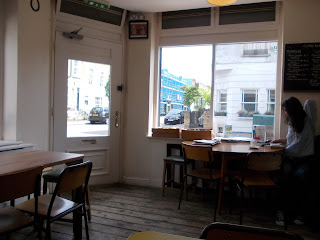 |
| Mustard and olive |
I’ve just read two of Simon Brett’s Charles Paris novels – Cast in Order of Disappearance and Amateur Corpse – back to back. They are early entries in a series that continued into the 90s, both published in the mid-70s. Charles is a usually out-of-work actor who has left his wife about 12 years earlier. His bid for adventure and freedom has led him no further than a dreary bedsit, with a rickety kitchen chair, yellow candlewick bedspread, and gas ring behind a plastic curtain. While picking up work here and there, Charles sometimes stumbles across mysteries or murders, and feels compelled to try and puzzle them out, using the many characters he has played over the years as a disguise.
I find Charles likeable, despite his drink problem, and particularly appreciate Brett’s sharp eye for the contemporary scene.
“The Bricklayers’ Arms was one of those modern pubs that capture all the atmosphere of an airport lounge. Hanging red lights shone on leatherette couches and framed relief pictures of vintage cars.” What has happened to pubs like this? All re-Victorianised? Charles later drops into a “a coach lamp and horse brasses pub” patronised by the “the local Scampi and Mateus Rosé crowd”.
“The door was opened by a woman in a pale pink nylon housecoat and pink fur slippers. She had prominent teeth and dyed black hair swept back in the style of a souvenir Greek goddess. Her face was heavily made up and eye-lashed... She ushered him into a stuffy little room lit by bright spotlights. It was decorated in orange and yellow, with a leopardette three-piece suite covering most of the carpet. Every available surface was crowded with small brass souvenirs. Lincoln imps, windjammer bells, lighthouses, anchor thermometers, knights in armour, wishing wells... On the dresser two posed and tinted photographs rose from the undergrowth of brass.” Popular in the 30s, miniature brass ornaments have never made a comeback.
In one Nouveau Riche interior “all the walls were hung with hunting prints which were anonymously expensive, bought on advice by a man without natural taste. Two enormous china Dalmatians stood guarding the front door” which "had a brass lion knocker and was white, with small square Georgian panels. The up-and-over garage door was panelled in the same way. In fact the whole scheme of the house was Georgian, with thin-framed white windows set in neat red brick. It was exactly the sort of house that anyone in Georgian England who happened to own two cars, a central heating oil tank, a television and a burglar alarm would have had."
Inside Charles finds: “jungle wallpaper, a Raspberry Ripple carpet and a green leather three-piece suite”. Also a giveaway are “the miniature cluster of swords and axes tastefully set behind a red shield on the wall. And the three-foot-high china pony pulling a barrel. And the wrought iron drinks trolley with the frosted glass top and gold wheels.”
The couple who live here sport “saxe-blue silk shirts” (the man) and “rainbow lamé slippers” (the woman.
At the suburban house of his friend, a successful lawyer: “The conversion had consisted mainly of sticking cork tiles on every available surface... The pale green bath, basin, bidet and lavatory were modem and functional. Fluffy yellow towels hung from the heated rail... The walls were olive green and the floor was covered with the same mustardy carpet as the bedroom.”
Gerald “was wearing a double-breasted gangster-striped suit over a pale blue T-shirt. Around his neck hung a selection of leather thongs, one for a biro, one for a packet of Gauloise, one for a Cricket lighter and others whose function was not immediately apparent. His lapels bristled with badges, gollies, teddy bears, a spilling tomato ketchup bottle and similar trendy kitsch.”
Brett is exaggerating, but not much. There was a fashion for wearing a biro or cigarette lighter on a thong round your neck. Another female character wears “a P.V.C. apron with a design of an old London omnibus”. Plastics were trendy because modern, and you could print anything on them, including the retro kitsch popular at the time.
The apercus keep coming: “Charles remembered how cheap he had always found the emotionalism of Wagner’s outpourings... Again Charles was conscious of the other man’s need for him. He was being paraded for the benefit of Hugo’s local crowd.”
There is way too much about Charles’s drinking. He and others (and readers) assume that investigation is his hobby, and that he blunders around until the solution falls into his lap, but actually he behaves quite like a regular detective. He starts off noticing something that doesn’t add up, or wants to help out an old friend or girlfriend, and then does the usual pondering and legwork.
What makes these books particularly 70s, apart from the clothes and the décor? Censorship had disappeared less than a decade ago, and now we could say anything, and girls were on the pill, and you didn’t have to marry them... Brett veers between voyeuristic salaciousness, and a vision of how life would really be for a 50-ish actor in this brave new world. Charles has a rather unbelievable number of one-night stands, but wants to fall in love like a 17-year-old, while admitting to himself that this is unlikely to happen.
More décor here.













